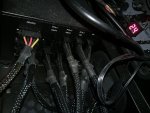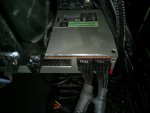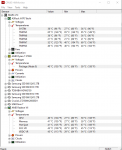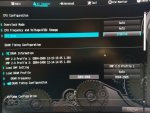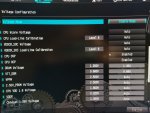AW: Häufige Abstürze - Hardware defekt?
Der Bugcheck 0x124 kommt nicht von Windows sondern wird von der CPU ausgelöst. Grund ist meistens ein Übertakten/Undervolten der CPU resp. ihres Cachespeichers, selten ein echter Hardwaredefekt der CPU.
Die Dumps vom 4. und 7. März sind korrupt:
.Unable to load image Unknown_Module_00000000`00000000, Win32 error 0n2
*** WARNING: Unable to verify timestamp for Unknown_Module_00000000`00000000
Unable to add module at 00000000`00000000
•
WHEA_UNCORRECTABLE_ERROR (124)
A fatal hardware error has occurred. Parameter 1 identifies the type of error
source that reported the error. Parameter 2 holds the address of the
WHEA_ERROR_RECORD structure that describes the error conditon.
Arguments:
Arg1: 0000000000000000, Machine Check Exception
Arg2: ffffe38649ba5028, Address of the WHEA_ERROR_RECORD structure.
Arg3: 00000000b4002800, High order 32-bits of the MCi_STATUS value.
Arg4: 00000000000c0135, Low order 32-bits of the MCi_STATUS value.
•
13: kd> !errrec ffffe38649ba5028
Common Platform Error Record @ ffffe38649ba5028
-------------------------------------------------------------------------------
Signature : *** INVALID ***
Revision : 0.0
Record Id : 0000000000000000
Severity : Recoverable (0)
Length : 0
Creator : {00000000-000f-0000-0100-000000000000}
Notify Type : {00000000-000f-0000-0100-000000000000}
Flags : 0x00000000
Im Dump vom 11.März:
Loading Dump File [E:\HELP\SigmundSeegras\031120-11265-01.dmp]
Mini Kernel Dump File: Only registers and stack trace are available
Symbol search path is: SRV*C:\Symbols*Symbol information
Machine Name:
Kernel base = 0xfffff802`4e200000 PsLoadedModuleList = 0xfffff802`4e648150
Debug session time: Wed Mar 11 17:23:55.703 2020 (UTC + 2:00)
System Uptime: 0 days 2:55:15.208
Loading Kernel Symbols
......
Loading User Symbols
Loading unloaded module list
.......
*******************************************************************************
* *
* Bugcheck Analysis *
* *
*******************************************************************************
Use !analyze -v to get detailed debugging information.
BugCheck 124, {0, ffffc283c27d5028, b4002800, c0135}
*** WARNING: Unable to verify timestamp for win32k.sys
*** ERROR: Module load completed but symbols could not be loaded for win32k.sys
Probably caused by : memory_corruption
Followup: memory_corruption
---------
11: kd> !analyze -v
*******************************************************************************
* *
* Bugcheck Analysis *
* *
*******************************************************************************
WHEA_UNCORRECTABLE_ERROR (124)
A fatal hardware error has occurred. Parameter 1 identifies the type of error
source that reported the error. Parameter 2 holds the address of the
WHEA_ERROR_RECORD structure that describes the error conditon.
Arguments:
Arg1: 0000000000000000, Machine Check Exception
Arg2: ffffc283c27d5028, Address of the WHEA_ERROR_RECORD structure.
Arg3: 00000000b4002800, High order 32-bits of the MCi_STATUS value.
Arg4: 00000000000c0135, Low order 32-bits of the MCi_STATUS value.
Debugging Details:
------------------
BUGCHECK_STR: 0x124_AuthenticAMD
CUSTOMER_CRASH_COUNT: 1
DEFAULT_BUCKET_ID: CODE_CORRUPTION
PROCESS_NAME: System
CURRENT_IRQL: f
STACK_TEXT:
ffffaf80`709f0da8 fffff802`4ecfeff8 : 00000000`00000124 00000000`00000000 ffffc283`c27d5028 00000000`b4002800 : nt!KeBugCheckEx
ffffaf80`709f0db0 fffff802`4f7a1920 : ffffc283`b8cfdcd0 00000000`00000000 ffffc283`c27d5028 00000000`00000000 : hal!HalBugCheckSystem+0xd8
ffffaf80`709f0df0 fffff802`4e541092 : ffffc283`b8cfdcd0 ffffaf80`709f0e79 00000000`00000000 ffffc283`c27d5028 : PSHED!PshedBugCheckSystem+0x10
ffffaf80`709f0e20 00000000`00000000 : 00000000`00000000 00000000`00000000 00000000`00000000 00000000`00000000 : nt!WheaReportHwError+0x382
STACK_COMMAND: kb
CHKIMG_EXTENSION: !chkimg -lo 50 -d !nt
fffff8024e285192-fffff8024e285197 6 bytes - nt!PspReaper+a2
[ cc cc cc cc cc cc:4c 87 00 98 c3 90 ]
fffff8024e375ffa-fffff8024e375fff 6 bytes - nt!xKdUnmapVirtualAddress+a (+0xf0e68)
[ cc cc cc cc cc cc:4c 87 00 98 c3 90 ]
fffff8024e376036-fffff8024e37603b 6 bytes - nt!IoAllocateErrorLogEntry+36 (+0x3c)
[ cc cc cc cc cc cc:4c 87 00 98 c3 90 ]
fffff8024e3c235a-fffff8024e3c235b 2 bytes - nt!ZwLoadKey3+2a (+0x4c324)
[ 84 00:4c 87 ]
fffff8024e3c235d-fffff8024e3c235f 3 bytes - nt!ZwLoadKey3+2d (+0x03)
[ 00 00 00:98 c3 90 ]
fffff8024e3c237a-fffff8024e3c237b 2 bytes - nt!KiBugCheckReturn+16 (+0x1d)
[ 84 00:4c 87 ]
fffff8024e3c237d-fffff8024e3c237f 3 bytes - nt!KiBugCheckReturn+19 (+0x03)
[ 00 00 00:98 c3 90 ]
fffff8024e3c24aa-fffff8024e3c24ab 2 bytes - nt!KeBugCheckEx+12a (+0x12d)
[ 84 00:4c 87 ]
fffff8024e3c24ad-fffff8024e3c24af 3 bytes - nt!KeBugCheckEx+12d (+0x03)
[ 00 00 00:98 c3 90 ]
fffff8024e3c25aa-fffff8024e3c25ab 2 bytes - nt!KeContextToKframes+fa (+0xfd)
[ 84 00:4c 87 ]
fffff8024e3c25ad-fffff8024e3c25af 3 bytes - nt!KeContextToKframes+fd (+0x03)
[ 00 00 00:98 c3 90 ]
fffff8024e3c25fa-fffff8024e3c25fb 2 bytes - nt!KiSaveInitialProcessorControlState+4a (+0x4d)
[ 84 00:4c 87 ]
fffff8024e3c25fd-fffff8024e3c25ff 3 bytes - nt!KiSaveInitialProcessorControlState+4d (+0x03)
[ 00 00 00:98 c3 90 ]
fffff8024e3c26ca-fffff8024e3c26cf 6 bytes - nt!KiRestoreProcessorControlState+ca (+0xcd)
[ 66 0f 1f 44 00 00:4c 87 00 98 c3 90 ]
fffff8024e3c284a-fffff8024e3c284b 2 bytes - nt!KiSaveProcessorControlState+17a (+0x180)
[ 84 00:4c 87 ]
fffff8024e3c284d-fffff8024e3c284f 3 bytes - nt!KiSaveProcessorControlState+17d (+0x03)
[ 00 00 00:98 c3 90 ]
fffff8024e3c28ca-fffff8024e3c28cf 6 bytes - nt!KiRestoreDebugRegisterState+7a (+0x7d)
[ cc 0f 1f 44 00 00:4c 87 00 98 c3 90 ]
fffff8024e3c2a5a-fffff8024e3c2a5b 2 bytes - nt!KiSaveDebugRegisterState+18a (+0x190)
[ 84 00:4c 87 ]
fffff8024e3c2a5d-fffff8024e3c2a5f 3 bytes - nt!KiSaveDebugRegisterState+18d (+0x03)
[ 00 00 00:98 c3 90 ]
fffff8024e3c2a6a-fffff8024e3c2a6f 6 bytes - nt!KeGetCurrentStackPointer+a (+0x0d)
[ cc cc 0f 1f 40 00:4c 87 00 98 c3 90 ]
fffff8024e3c2a7a-fffff8024e3c2a7b 2 bytes - nt!KeResetLegacyFloatingPointState+a (+0x10)
[ 1f 80:4c 87 ]
fffff8024e3c2a7d-fffff8024e3c2a7f 3 bytes - nt!KeResetLegacyFloatingPointState+d (+0x03)
[ 00 00 00:98 c3 90 ]
fffff8024e3c2a8a-fffff8024e3c2a8f 6 bytes - nt!KeSaveLegacyFloatingPointControlWord+a (+0x0d)
[ cc cc 0f 1f 40 00:4c 87 00 98 c3 90 ]
fffff8024e3c2aaa-fffff8024e3c2aab 2 bytes - nt!KeRestoreLegacyFloatingPointControlWord+1a (+0x20)
[ 84 00:4c 87 ]
fffff8024e3c2aad-fffff8024e3c2aaf 3 bytes - nt!KeRestoreLegacyFloatingPointControlWord+1d (+0x03)
[ 00 00 00:98 c3 90 ]
fffff8024e3c2d7a-fffff8024e3c2d7b 2 bytes - nt!NtContinue+2ca (+0x2cd)
[ 84 00:4c 87 ]
fffff8024e3c2d7d-fffff8024e3c2d7f 3 bytes - nt!NtContinue+2cd (+0x03)
[ 00 00 00:98 c3 90 ]
fffff8024e4b335a-fffff8024e4b335f 6 bytes - nt!KiForceIdleStopDpcRoutine+ea (+0xf05dd)
[ cc cc cc cc cc cc:4c 87 00 98 c3 90 ]
fffff8024eacbb2a-fffff8024eacbb2f 6 bytes - nt!PspProcessRundownWorker+aa
[ cc cc cc cc cc cc:4c 87 00 98 c3 90 ]
fffff8024eacbb92-fffff8024eacbb97 6 bytes - nt!PspProcessRundownWorkerSingle+62 (+0x68)
[ cc cc cc cc cc cc:4c 87 00 98 c3 90 ]
110 errors : !nt (fffff8024e285192-fffff8024eacbb97)
MODULE_NAME: memory_corruption
IMAGE_NAME: memory_corruption
FOLLOWUP_NAME: memory_corruption
DEBUG_FLR_IMAGE_TIMESTAMP: 0
MEMORY_CORRUPTOR: LARGE
FAILURE_BUCKET_ID: X64_MEMORY_CORRUPTION_LARGE
BUCKET_ID: X64_MEMORY_CORRUPTION_LARGE
Followup: memory_corruption
---------
11: kd> !errrec ffffc283c27d5028
===============================================================================
Common Platform Error Record @ ffffc283c27d5028
-------------------------------------------------------------------------------
Record Id : 01d5f7a098f6279c
Severity : Fatal (1)
Length : 936
Creator : Microsoft
Notify Type : Machine Check Exception
Timestamp : 3/11/2020 15:23:55
Flags : 0x00000000
===============================================================================
Section 0 : Processor Generic
-------------------------------------------------------------------------------
Descriptor @ ffffc283c27d50a8
Section @ ffffc283c27d5180
Offset : 344
Length : 192
Flags : 0x00000001 Primary
Severity : Fatal
Proc. Type : x86/x64
Instr. Set : x64
Error Type : Cache error
Operation : Data Read
Flags : 0x00
Level : 1
CPU Version : 0x0000000000800f82
Processor ID : 0x000000000000000b
Instr Pointer : 0x0xfffff8025f5b0c9a
===============================================================================
Section 1 : x86/x64 Processor Specific
-------------------------------------------------------------------------------
Descriptor @ ffffc283c27d50f0
Section @ ffffc283c27d5240
Offset : 536
Length : 128
Flags : 0x00000000
Severity : Fatal
Local APIC Id : 0x000000000000000b
CPU Id : 82 0f 80 00 00 08 10 0b - 0b 32 d8 7e ff fb 8b 17
00 00 00 00 00 00 00 00 - 00 00 00 00 00 00 00 00
00 00 00 00 00 00 00 00 - 00 00 00 00 00 00 00 00
Proc. Info 0 @ ffffc283c27d5240
===============================================================================
Section 2 : x86/x64 MCA
-------------------------------------------------------------------------------
Descriptor @ ffffc283c27d5138
Section @ ffffc283c27d52c0
Offset : 664
Length : 272
Flags : 0x00000000
Severity : Fatal
Error : DCACHEL1_DRD_ERR (Proc 11 Bank 0)
Status : 0xb4002800000c0135
Address : 0x01000000ef522040
Misc. : 0x0000000000000000
Und hier steht unter Section2 der Grund, Ein Lesefehler (DRD_ERR) im L1 Cache des 12.Prozessorkerns (es zählen auch virtuelle Kerne resp. Threads)
